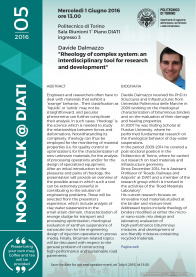05 - NoonTalk@DIATI
Mercoledì 1 giugno 2016 - ore 13:00
RHEOLOGY OF COMPLEX SYSTEM: AN INTERDISCIPLINARY TOOL FOR RESEARCH AN DEVELOPMENT
Sala Riunioni 1° Piano DIATI ingresso 3, Politecnico di Torino - Corso Duca degli Abruzzi 24, Torino
Seminario con Davide Dalmazzo
BIOGRAFIA
Davide Dalmazzo received his PhD in Structures and Infrastructures from Università Politecnica delle Marche in 2009 working on the rheological characterization of bituminous binders and on the evaluation of their damage and healing properties.
In 2007 he was Visiting Scholar at Purdue University, where he performed fundamental research on the rheological behavior of clay-water suspensions.
In the period 2009-2014 he covered a post-doctoral position in the Politecnico di Torino, where he carried out research on road materials and infrastructure geometry.
Since December 2014, he is Assistant Professor of “Roads, Railways and Airports” at DIATI and a member of the research group which is involved in the activities of the “Road Materials Laboratory”.
His current research focuses on innovative road materials studied at the binder and mixture level. Addressed topics include rheology of binders modified at either the microor nano-scale, mix design and laboratory evaluation of high-performance bituminous mixtures, and development of eco-friendly mixtures containing recycled materials.
ABSTRACT
Engineers and researchers often have to deal with materials that exhibit a “strange” behavior… Their classification as “liquids” or “solids” may not be straightforward, and peculiar phenomena can further complicate their analysis. In such cases, “rheology” is the science which is needed to study the relationships between forces and deformations. Notwithstanding its
complexity, rheology can thus be employed for the monitoring of material properties (i.e. for quality control or optimization), for the characterization of new unknown materials, for the analysis of processing operations and/or for the design of specialized equipment.
After an initial introduction to the pleasures and pains of rheology, the presentation will provide an overview of the possible areas in which such a tool can be extremely powerful in contributing to the solution of engineering problems. These will be
selected from the presenter’s experience, which include analysis of clay-water suspensions in the small-strain domain, characterization of sewage sludge for transport and processing optimization, rheological evaluation of xanthan suspensions of
nanoscale iron for the engineering design of injection operations in porous media. Finally, bitumen-related topics will be discussed with respect to the general problem of constructing high-performance and sustainable road pavements.

